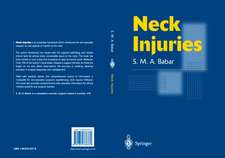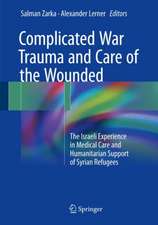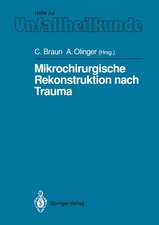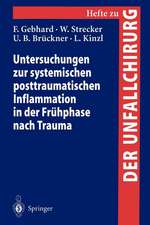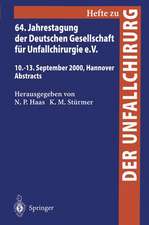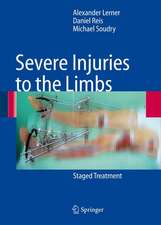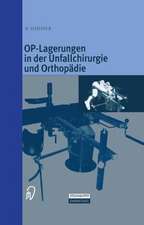Armed Conflict Injuries to the Extremities: A Treatment Manual
Editat de Alexander Lerner, Michael Soudryen Limba Engleză Hardback – 19 mai 2011
| Toate formatele și edițiile | Preț | Express |
|---|---|---|
| Paperback (1) | 1107.21 lei 39-44 zile | |
| Springer Berlin, Heidelberg – 23 aug 2016 | 1107.21 lei 39-44 zile | |
| Hardback (1) | 1315.15 lei 3-5 săpt. | |
| Springer Berlin, Heidelberg – 19 mai 2011 | 1315.15 lei 3-5 săpt. |
Preț: 1315.15 lei
Preț vechi: 1384.36 lei
-5% Nou
Puncte Express: 1973
Preț estimativ în valută:
251.66€ • 269.11$ • 209.82£
251.66€ • 269.11$ • 209.82£
Carte disponibilă
Livrare economică 27 martie-10 aprilie
Preluare comenzi: 021 569.72.76
Specificații
ISBN-13: 9783642161544
ISBN-10: 3642161545
Pagini: 506
Ilustrații: XVI, 413 p.
Dimensiuni: 193 x 260 x 24 mm
Greutate: 1.2 kg
Ediția:2011
Editura: Springer Berlin, Heidelberg
Colecția Springer
Locul publicării:Berlin, Heidelberg, Germany
ISBN-10: 3642161545
Pagini: 506
Ilustrații: XVI, 413 p.
Dimensiuni: 193 x 260 x 24 mm
Greutate: 1.2 kg
Ediția:2011
Editura: Springer Berlin, Heidelberg
Colecția Springer
Locul publicării:Berlin, Heidelberg, Germany
Public țintă
Professional/practitionerCuprins
Organization of urgent medical aid, including mass casualty and triage.- Wound ballistics.- Damage Control.- Crush injury to limbs.- Anesthesiology in emergency patients.- Hemotransfusion in combat trauma.- Diagnostic imaging in combat trauma.- Soft tissue debridement.- Primary fracture stabilization.- Prophylaxis of wound infections after combat trauma.- Vascular trauma to limbs.- Peripheral nerve injury.- Plastic coverage of soft tissue defects.- Definitive bone reconstruction using internal fixation methods.- Definitive bone reconstruction using external fixation, including management of the severe bone loss.- Hand injuries.- Foot surgery.- Limb salvage versus amputation: The dilemma.- Amputation.- Complications: delayed unions, nonunions.- Osteomyelitis.- Pain treatment.
Recenzii
From the reviews:
“It presents a broad approach to limb injuries with an emphasis on the accumulated experience of combat and civilian orthopedic surgeons. Traumatologists, emergency physicians, intensivists, and orthopedists with an interest in injury are an appropriate audience for this work … . This is an important contribution for both traumatologists and other physicians working with these patients. … This group provides an excellent overview with multidisciplinary value.” (David J. Dries, Doody’s Review Service, October, 2011)
“Provides the reader with a concise and important review of treatment of high-energy injuries that occur during armed conflict. … The layout is appropriate for readers not only interested in learning about the treatment of these types of injuries but charged with the responsibility of treating these patients. … it is an excellent resource for those called on to treat such catastrophic injuries. … This important text provides a much-needed reference for readers unfortunate enough to have to deal with these types of injuries.” (Michael A. Terry, Journal of the American Medical Association, Vol. 307 (2), January, 2012)
“It presents a broad approach to limb injuries with an emphasis on the accumulated experience of combat and civilian orthopedic surgeons. Traumatologists, emergency physicians, intensivists, and orthopedists with an interest in injury are an appropriate audience for this work … . This is an important contribution for both traumatologists and other physicians working with these patients. … This group provides an excellent overview with multidisciplinary value.” (David J. Dries, Doody’s Review Service, October, 2011)
“Provides the reader with a concise and important review of treatment of high-energy injuries that occur during armed conflict. … The layout is appropriate for readers not only interested in learning about the treatment of these types of injuries but charged with the responsibility of treating these patients. … it is an excellent resource for those called on to treat such catastrophic injuries. … This important text provides a much-needed reference for readers unfortunate enough to have to deal with these types of injuries.” (Michael A. Terry, Journal of the American Medical Association, Vol. 307 (2), January, 2012)
Notă biografică
Alexander Lerner is working at the Rambam Medical Center in Haifa, Israel, which is specialised in the treatment of military and civilian casualties. He is an orthopaedic surgeon, member in a number of international learned societies, has lectured worldwide and has heavily published in international journals.
Textul de pe ultima copertă
Modern weapons and high-energy accidents inflict devastating damage to soft tissue and bone. As a result, both primary treatment and late limb reconstruction present a difficult surgical challenge. This book is designed to meet the continued need to re-learn the principles of treatment of complex war injuries to the extremities in order to minimize post-traumatic and post-treatment complications and to optimize functional recovery.
Most of the chapters in the book are based on the unique experience gained in the treatment of military personnel who have suffered modern combat trauma and civilian victims of terror attacks at a single, large level 1 trauma center. The remaining chapters present the experience of leading international authorities in the field of trauma and reconstructive surgery. A staged treatment protocol is presented, ranging from primary damage control, including the use of external fracture stabilization, through to definitive functional limb reconstruction by means of various internal and external fracture fixation methods. The organization of medical aid, anesthesiology, diagnostic imaging, and infection prophylaxis also receive detailed attention. The management of potential complications such as delayed unions, non-unions, and osteomyelitis is reviewed, and controversies in limb salvage are considered. Primary and late limb amputations are fully discussed, and a special chapter is devoted to the challenging dilemma of limb salvage versus amputation in the treatment of limbs at risk.
This well-illustrated book will be of value both to beginners and to experts in the field of trauma, including orthopedic surgeons, plastic surgeons, vascular surgeons, and military medical personnel.
Most of the chapters in the book are based on the unique experience gained in the treatment of military personnel who have suffered modern combat trauma and civilian victims of terror attacks at a single, large level 1 trauma center. The remaining chapters present the experience of leading international authorities in the field of trauma and reconstructive surgery. A staged treatment protocol is presented, ranging from primary damage control, including the use of external fracture stabilization, through to definitive functional limb reconstruction by means of various internal and external fracture fixation methods. The organization of medical aid, anesthesiology, diagnostic imaging, and infection prophylaxis also receive detailed attention. The management of potential complications such as delayed unions, non-unions, and osteomyelitis is reviewed, and controversies in limb salvage are considered. Primary and late limb amputations are fully discussed, and a special chapter is devoted to the challenging dilemma of limb salvage versus amputation in the treatment of limbs at risk.
This well-illustrated book will be of value both to beginners and to experts in the field of trauma, including orthopedic surgeons, plastic surgeons, vascular surgeons, and military medical personnel.
Caracteristici
Based on unique experience in the treatment of military personnel and civilian casualties at a large level 1 trauma center Presents a staged treatment protocol, ranging from primary damage control through to definitive functional limb reconstruction Discusses infection prophylaxis, management of complications, and rehabilitation Of value to both beginners and experts in the field of trauma Includes supplementary material: sn.pub/extras

